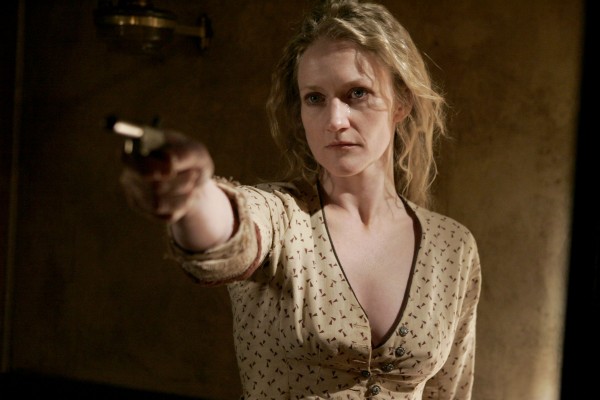
Editor’s note: Extreme spoiler alert. Seriously, do yourself a favor and watch Deadwood before reading this, if for some inexplicable reason you haven’t yet.
I started watching Deadwood when the cabbie I was sleeping with at the time told me it was a Wild West show about a town run by whores. “You’ll love it!” he assured me. Turns out he was almost entirely wrong about the plot, but he was right about me loving it. The sex workers are a small part of the overall action, yet the majority of female characters are sex workers. And for me, the sex workers are the heart of the show, its moral and empathic compass. But empathy and ethics can have a price, especially for the marginalized.
Creator David Milch explains that the creation of Deadwood was based on his desire to explore the formation of civilization out of chaos. Chaos is what the territory of Deadwood is when the series opens. It’s the go-to headline for any sporting event or Republican or Democratic convention that sex workers flock to where the money is. In terms of boom towns like Deadwood it’s largely true, not just because of the presence of fast and loose cash, but because of the freedom of movement, both social and physical, offered by the very lack of civilization Milch is exploring.
That life in the still-lawless camp of Deadwood allows a certain amount of freedom as well as deprivation is obvious, and that lives lived on the margins of a camp like Deadwood offer liberty and danger, even to women, even to sex workers, is made apparent immediately in the first episode. Thirteen minutes in a gun goes off in Al Swearingen’s saloon-brothel.
“Aw, hell,” says right-hand man Dan Dority despairingly. “That fuckin whore.”
And so we meet Trixie (Paula Malcomson), who enters with a literal bang, as she’s just shot and killed a client in self-defense.
“He was beating on me! I told him not to beat on me!” she explains hopelessly, knowing already her bruises won’t be an adequate excuse to her boss. Swearingen beats her himself, adding a reminder to everyone that she’s not allowed to own a gun. Unfazed, Trixie immediately sneaks her servant friend, Jewel, money to bring her another gun.
The freedom allowed her here may not be immediately apparent to a civilian, but the fact that she was allowed to defend herself against a beating, to shoot someone without being fired or killed, and allowed to continue working with everyone’s unspoken knowledge that she’s just going to acquire another gun, is massive. This freedom will be lost by the untimely end of the show, when civilization comes in the barbaric entrepreneur figure of George Hearst.
In the meantime, the sex workers of the first season have a singular amount of screen time, especially with the arrival of Joanie (Kim Dickinson) and the other girls of Bella Union, the new brothel, waving brightly from owner Cy Tolliver’s festively festooned wagon. This entrance highlights something that hasn’t been visible till now: Swearingen’s joint, the Gem, is a rough-and-tumble working class saloon and brothel. While the Gem girls wear loose shifts and little or nothing else, the Bella Union workers are adorned with the Wild West fashion you’ve been dreaming of: beribboned corsets, garters, thigh highs, hair in tumbled curls and cascading updos. I’d watch the show just for their clothes. Unfortunately, it’s the men running this here town and you know there’s going to be a clash with a fancy new brothel steppin’ on Swearingen’s turf.
In the background of Swearingen and Tolliver’s turf war, being used as pawns, are the vibrant women who work for them. I’m focused on Joanie and Trixie here, and the handful of other sex workers who are allowed plotlines. While they’re considered tools in the political struggles between Tolliver and Swearingen, and then between Swearingen and Hearst, the camera shows this to be a misjudgment and a mistake on the part of the men (one that only Swearingen learns from, belatedly). While not exactly happy, Joanie and Trixie are lively presences, not the passive background decor sex workers function as on shows like The Sopranos. Even when they’re silent, we can feel their judgment, and so can Tolliver and Swearingen.
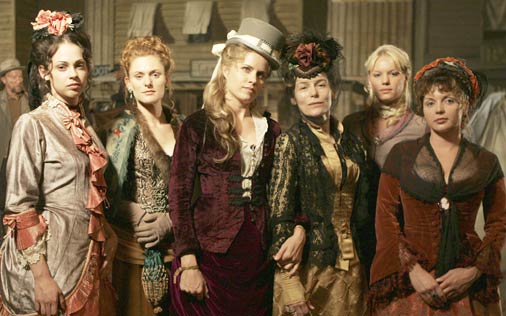
The girls at the Gem look unkempt compared to the Bella Union girls. Though Tolliver’s sneering dismissal that they’ll have different client bases is off—the only clients around are uniformly filthy miners—there does seem to be a class difference between the two brothels. This first impression of difference is not entirely valid: they have other differences as well. Tolliver is controlling and abusive for his own pleasure and gain, while Swearingen is controlling and abusive in the service of a grander vision: Deadwood’s potential. While Trixie’s rage and helplessness is apparent from her introduction in contrast, at first sight Joanie Stubbs seems like a happy hooker. Her clothes are gorgeous and Tolliver has made an obvious pet of her, putting her in charge of his workers and allowing her freedom about when to take clients herself, as long as she hustles them at the gambling table.
It’s his making a pet of her that gives one pause after watching more than a few moments of their interactions. Under her veiled top hat, Joanie is miserable. Despite being a lesbian, being madam to a bunch of sex workers apparently isn’t her dream gig, though she does use her sexuality for revenge against Tolliver as necessary, making sure he catches her bathing the other women and kissing them, their physical relations an incontrovertible rejection of his claims on her.
Whereas Tolliver and Joanie struggle over Joanie’s freedom for the stretch of the first season, her unhappiness growing with the arc of the plot, Trixie’s departure from the Gem begins inadvertently, as Swearingen plots to use her to get at the rich widow Alma Garrett. Sent to be a nurse to Alma’s ward, Trixie is instructed by Al to encourage Alma’s dependence on laudanum, a carelessly cruel instruction given that Trixie herself is a former addict. It’s her empathy as a former addict, and her innate compassion and integrity, that give her the strength to go against her boss, secretly helping Alma kick the drug and taking care of Alma’s ward while Alma herself goes through withdrawal. It’s a hopeful time, and too early in the season for such hope. Of course something will go wrong. But Trixie nurses Alma through kicking opiates and coaches her on how to hide her efforts to get clean.
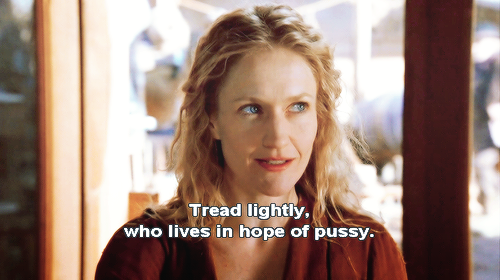
It’s here that innkeeper E.B. Farnum’s cruel description of Alma as a bitch in heat seems less misogynist and more accurate: led by lust for uptight Seth Bullock, Alma disregards her promises to Trixie, offering her instead the meaningless “opportunity” to take Sofia to New York without Alma, “with introductions,” then offering Trixie gold as she realizes how callous and useless her offer of introductions to a society that will never accept Trixie unaccompanied was. “There’s more,” she promises, unaware that it’s too late, and her betrayal has decided Trixie in favor of the stability of the Gem and the way she’s valued there. I believe we’re meant to feel pity and sadness at the sight of this prostitute returning to the brothel, rejecting civilization, but my pity was for Alma, in over her head in Deadwood. The one thing the gold does, however, is buy Trixie her freedom. Alma watches Trixie walk back into the Gem, but she doesn’t see what happens there: Trixie slaps the gold on the nightstand in front of Al and gets into bed.
“Will there be more?” he asks.
“No,” she says, and though we don’t fully know it yet, Trixie has bought her independence, though for Trixie that doesn’t mean leaving Swearingen or the Gem immediately or entirely. While Joanie rejects Tolliver’s claims on her, Trixie feels she owes Swearingen her time and emotional investment. Though her background is mysterious she drops various hints about the ways he’s been good to her, the fact that—unlike the one between Joanie and Tolliver, her relationship with Swearingen is too complex to be entirely reduced to an equation of exploitation and freedom. In one of her occasional asides to Saul half-explaining Swearingen and the fragile and precious moments of kindness he offers between maintaining the exterior of an asshole, she points out,
Don’t buy his bullshit about the nine cent trick [a cruel joke at the expense of the disabled cook]. Why she’s [the cook] around is, it’s his sick fuckin’ way of protecting her. There’s entries on both sides of the fuckin’ ledger, is the fuckin’ point.
Swearingen giveth, and Swearingen taketh away, but it’s always Swearingen’s prerogative. Trixie’s very ability to explain Swearingen’s motives in the language of double-entry bookkeeping is itself a result of Swearingen’s granting her freedom: to leave the saloon, learn bookkeeping, and form a relationship with merchant Saul Star. After the initial denial of Trixie’s right to leave, Swearingen is the greatest supporter of her learning other skills: As she barges into the Gem furious over her inability to learn some arithmetic—and over the class and education inequalities this reveals between herself and Saul—Swearingen listens, talks her down, and sends her back.

While Trixie is (semi)-respectably occupied and beginning to envision a better life for herself, conflict erupts at the Bella Union, forcing Joanie find a way out. Joanie doesn’t have the firm presence of Swearingen to support and protect her in times of trouble, and it’s Joanie’s misfortune that she’s constantly surrounded by people who view her best qualities—her kindness, her soft heart and her desire to protect others—as weaknesses to be exploited, usually with violence. Joanie’s storyline is studded with violence and death, unparalleled by anyone else in the show. Her catalyst for finally leaving Tolliver is a murder, the victim arriving not-so-innocently in the form of a bewigged Kristen Bell, a baby tart on the make.
It’s a tiny two-episode cameo, but one of the highlights of the show for me. Bell’s angular features are perfect for her sharp character, Flora. She’s looked better (that wig is hideously unflattering) but her wardrobe is perfect prissy youthfulness, a disguise, just like her unconvincingly sweet smiles, down to her pert bustle and bonnet. Her pretty face and petite stature immediately rouse protective feelings in Joanie, who helps Flora start her new career with this admonishment:
I’d prefer you happy, honey, but if you can’t be, you need to pretend at it better than you’re doing, or you’re going to be hungry, and cold, and getting done to you for nothing outside what you’d have made money to live on and save up besides if you’d acted the part in here.
A private warning familiar to any survivor sex worker who’s felt burnout: fake it til you make it, or you’re lost.
“I thought I only had to act it with them that wanna stick it in me,” Flora says petulantly.
“You never know who that might be, Flora.” A warning, maybe. But also a weakness revealed. Flora smiles triumphantly.
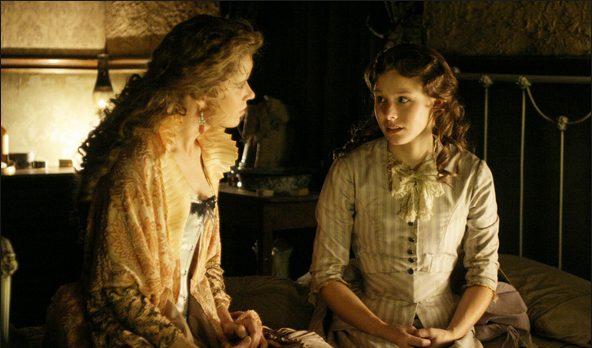
Joanie isn’t the only person at the Bella Union to feel a soft spot for Flora: after one session, much harassment, and polite deferment in the brothel, a client follows her outside after her shift, and now we meet the real Flora, just a warning of what’s to come:
“You geek-looking fuck. Get away from me before I cut your fucking heart out.”
Haven’t we all wanted to say that to an obnoxious customer? Flora means it, though, and she has the knife to back it up, though she lets it drop this time. Her plans require her to stay on at the Bella Union a bit longer and not get fired for threatening to kill a customer. Joanie, with her tender heart and her expensive cache of jewelry, has given Flora a target, and she acts quickly, coming to Joanie for comfort and spooning with her, taking advantage of the chink she senses in Joanie’s armor.
Tolliver regards Flora with a mix of jealousy and suspicion. His suspicion is later validated when Flora makes off with Joanie’s jewelry. Tolliver forces Joanie to watch and participate in Flora’s execution. It is the final straw of Joanie’s quiet burnout: after Flora is dead Joanie tries to turn the gun on herself, and Tolliver wrestles it away from her.
“You keep drawing breath right here,” he whispers in her ear.
But Joanie will never recover, not under his roof: “Kill me too, Cy, or let me go,” she begs him as they stand on the balcony of the Bella Union later that night.
Tolliver rears back, startled. “I understood my self to be saying Joanie, I want a find a way to give you a looser fuckin’ rein.”
But Joanie isn’t fooled by his talk of a looser rein. “You’ve got to find a way to mean it,” she pleads with him. “If you don’t kill me or let me go, I’m gonna kill you.” She doesn’t mean it as a threat, but as a desperate plea. Tolliver leaves her in silence, and in silence Joanie watches Trixie walk from the doctor’s shack back to the Gem; not coincidentally this is also the episode where Trixie also tries to kill herself and where she begins to establish space from Al with the gold Alma gave her, the sort of space Joanie needs badly herself.
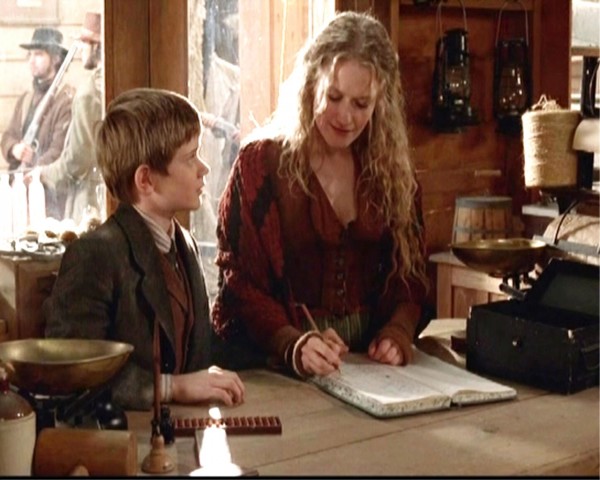
Joanie and Trixie start season two on the verge of freedoms that would have seemed beyond dreaming in season one. Trixie is doing accounts with Saul and Joanie is on the verge of opening a new brothel, the Chez Ami. They even get their freedom within the same episode: Mattie arrives in episode three, as Trixie goes to Saul Starr and asks him if he’ll teach her how to do his books. It’s the quality of Swearingen and Saul’s support that feeds Trixie’s strength: she becomes integrated into the community of Deadwood in a new way while Joanie, lacking anything similar, becomes more isolated by the events of season two.
The news of Joanie’s abdication as his crown jewel is sprung on Tolliver with the arrival of three gorgeous new ladies of the night, city girls led by Mattie, an old friend of Joanie’s. Mattie never loses her warm smile, not at Tolliver’s barely concealed hostility at Joanie’s flight, not as Tolliver demands sixty cents on every dollar they make, not even when he forces them to take along a terrified Bella Union worker to spy on them. Mattie is unflappable: the iron presence Joanie needs to stand up to and escape from Cy Tolliver.
But it isn’t just Mattie’s backbone that’s made of iron. She has a card up her sleeve: Joanie is not the only one to have invited her to Deadwood and this other offer is backed by the kind of money that can change lives, from the kind of big-time client we all dream of. Mr. W., she calls him, but there’s a less than minor catch:
“Mr. W. enjoys being cranky with his women. But sometimes when disappointed his crankiness runs away with him.”
“What’s gonna disappoint him?” Joanie asks.
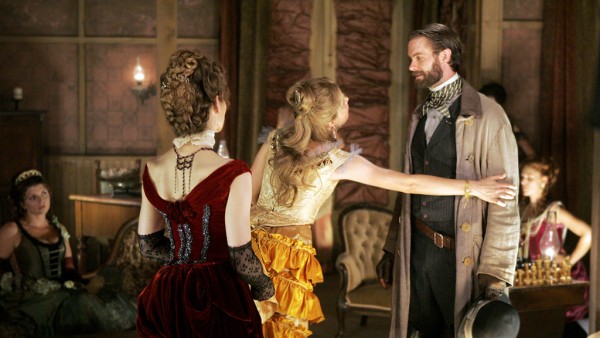
Mattie has the girl he wants waiting in Colorado to amp up his anticipation—and the price he’s willing to pay—though as she acknowledges, the crankiness caused by having to wait may exact a price from the girl. But who cares? She and Joanie will be sharing the profits 50/50.
“What’s the girl’s end?” Joanie asks, with feigned indifference.
“I wouldn’t rule out a wooden box,” answers Mattie, with indifference that’s very real.
With Mr. W. at the brothel in the flesh, and his desired girl still on ice in Denver, Joanie takes him on herself to prevent any of the other women at the brothel getting hurt in his disappointment. She follows him into her room and flips her bodice up to show the gun stuffed in her bustle. If this was meant to reassure Mattie, it has the opposite effect. Mattie’s not grateful. She loses her fixed smile for the first time:
“If she kills that fucking cocksucker I’m gonna be working for the rest of my life.”
And now we have the real Mattie behind the smile, as ruthless and cold as Swearingen or Tolliver, and with as little regard for the lives of her workers. Her career plan has been to provide Mr. W. with girls—his proclivities make an ongoing supply necessary—until she has enough money to retire. A dream client indeed, and a fortune she thinks she can exact at no cost to herself.
Inside the bedroom all is not well, though it could be worse. Joanie deals with Mr. W. with cautious sauciness, distracting him from the idea of going back out to pick a girl of his “type” to take his ire out on and working with the very little he gives her until he loses interest. “Nuts,” she says with pretend petulance as he gets up to go, energy for taking his anger out on someone momentarily dissipated.
He doesn’t come back until his chosen girl, Carrie, arrives. Mirroring Mr. W.’s inquiries, still thinking she can avert violence, Joanie gives Carrie a bath after her first session with him, probing her about Mr. W. and what he likes. Carrie is still too young and beautiful to believe in danger to herself, and she shrugs off Joanie’s concern.
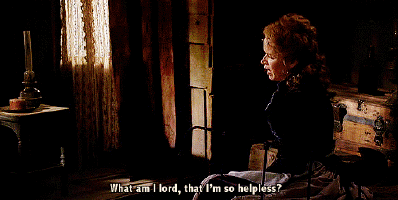
When the violence does come it’s brief and brutal, triggered by Tolliver’s actions and not by anything said or done by the women at the Chez Ami. Mattie’s final betrayal of Joanie, refusing to allow her to try and save Doris or Carrie, is paid for with her own life while Joanie runs to Tolliver for help, unaware that he set Mr. W. off in the first place. Tolliver is the wrong man to go to for a lot of other reasons: he helps Mr. W. clean up the women’s bodies and keep the murders under wraps and never tells Joanie the truth about the level of his involvement. Joanie is left alone, to protect her remaining workers and herself from Mr. W.
The most heartbreaking moment comes as she explains the situation to Charlie the postman while asking for his help in smuggling the survivors out of camp before they can be silenced by Tolliver too.
“Mattie was the first I ever met who wasn’t afraid of men,” she says softly. Every woman in her family was, every woman she ever met was, until Mattie. Even Joanie, she’s afraid of men. Mattie’s fearlessness helped Joanie escape Tolliver, and it brought Mattie to the miscalculation that led to her own death: thinking that her knowledge of Mr. W.’s penchant for violence was safety against it being turned on herself, thinking that she could make herself matter. In the face of blackmail, Mr. W. takes the quickest way out: he kills her too.
“He killed them,” Joanie says.
“Why?”
“I don’t know that. I’m not a man.” Understated but plaintive, Kim Dickens’ reading of Joanie’s line hit me hard, rewatching the scene this spring. All Joanie’s struggles to be free, all Mattie’s struggles and plans to retire, don’t matter in the face of Mr W’s rage and incredibly poor impulse control paired with his misogynist homicidal tendencies.
There’s a moment where Joanie tries to comfort Flora about being witness to a murder, reassuring her that, “You get just a little notice, just a couple of seconds, before the one thing turns into the other, it’s like a funny smell comes into the air, and then you know there’s no more steering and get the hell out of the way.” These words are prophetic for the rest of Joanie’s trajectory: she can’t stop what’s coming and she can’t even help other people to do the same. She can only bear witness to the disasters, and each woman killed only shatters her more. Only her developing relationship with Jane, the town drunk, begins to help her heal.
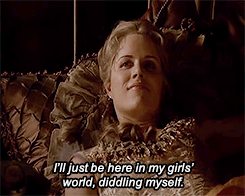
Joanie’s place in the community—Mattie’s place, Carrie and Dora’s places, their lives—all rely on the generosity of men; even Trixie’s life ultimately relies on Swearingen’s generosity. Their freedom to defend themselves and their friends disappears as civilization makes its inroads into Deadwood with mine owner George Hearst. George Hearst is another man with poor impulse control; incredibly wealthy, he can indulge his lack of empathy (and his employees’ lack of empathy: Mr. W. worked for Hearst) to an incredible degree, culminating in his murder of Alma’s second husband and Trixie’s friend, Ellsworth. Trixie, led by her hairtrigger temper, unbuttons her shirt (breasts distract men, we all know this), marches up to Hearst’s door, shoots him, and runs. She fails to kill him. If there was any confusion left about the balance of power in Deadwood, Hearst now does away with it. He demands to see his shooter dead. And Swearingen, Swearingen who’s always had a soft spot for Trixie, who maybe even loves Trixie in his way, protects her again, providing another dead sex worker, specially murdered for the occasion, in Trixie’s place.
For the most part men are obstacles to be worked around, the more or less unpleasant arbiters of the boundaries within which Trixie and Joanie live their lives. But when it comes right down to it, their lives are in the hands of men. Mr. W. was more blatant and less utilitarian in his violence, but he and Swearingen and Tolliver and Hearst exercise the same power of life and death. The men hold the power and power is their main concern, power to guide events according to their own plans and priorities: Swearingen for Deadwood, Tolliver for power, Hearst for gold. But it’s Joanie and Trixie whose integrity and empathy and heartbreak and rage fuel the show. And it’s their similar struggles for freedom from the constraints of their lives and the ways those struggles rebound on them that becomes the emotional center of the show.
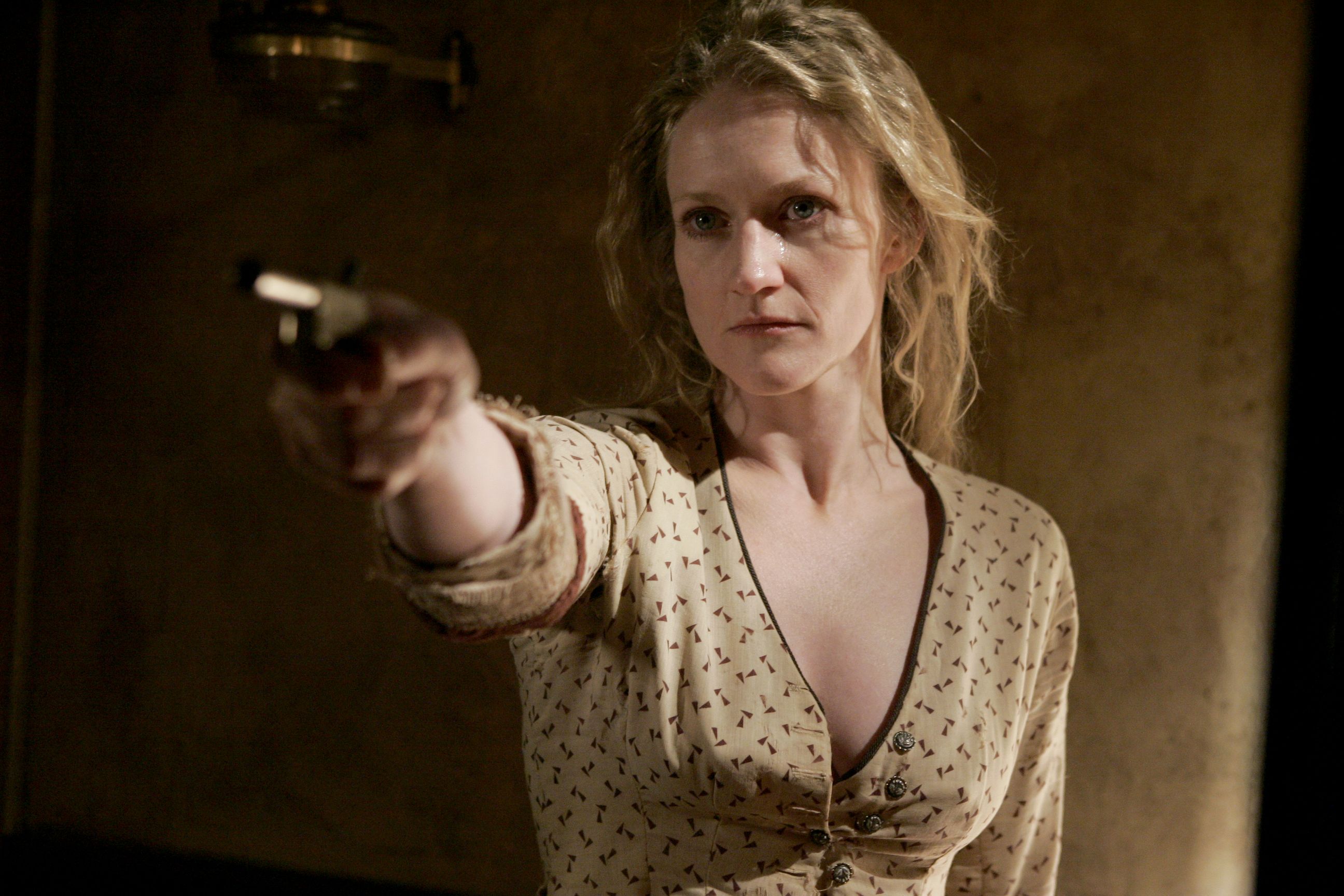
I absolutely LOVE Deadwood, such an awesome show!!
I subscribe to RACK, so education about what I do is very important. Whenever I get someone interested in doing sounds, I teach them what sounds were originally used for, then I send them here:
https://www.youtube.com/watch?v=PZj7H8sfkR0
Of course, sounding isn’t nearly this painful, but I like my subbies to know the history behind them and I love this scene 🙂
Glad you found this awesome show !
😉
K
OMG, I forgot about that scene! My partner has kidney stones as well as a number of other medical ailments right now, and I’ve been really frustrated about how slow his healthcare providers have been to schedule them to be blasted away. But at least he won’t have to deal with THAT when they actually do it…
LOVE this piece, though I wish it had touched on Joanie and Jane’s relationship
i agree with diana most all of us have relationships similar
I know I’m late to this party, but I just had to tell you Red your thoughtful analysis moved me to tears. So well said. Thank you.